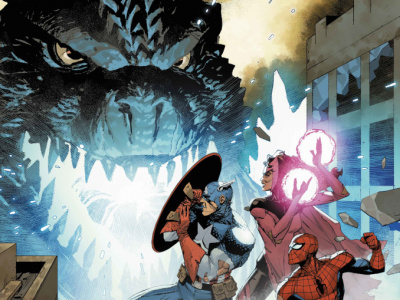
We got a chance to sit down with Tokyopop CEO Stuart Levy at New York Comic Con. Levy is the founder of the Tokyopop Group, which includes six companies in the
How do you think the consumer appetite for Japanese content is changing?
The consumer appetite for Japanese content is still there, but a lot of people are able to get stuff online for free. And there’s another thing that I’ve noticed over the past few years. At conventions instead of fans getting behind a show (an anime) or a manga title, it seems like fans are doing cosplay and hanging out and it’s a little bit more of a community-based, social environment. Maybe that’s the result of what’s happened on the Web, but that’s part of it too.
Tokyopop exited the anime business a couple of years ago. What do you think the future of anime is here in the
It’s not just about anime. I think a lot about all entertainment businesses, including film and television, and the digital revolution is a significant one. At the end of the day are we really talking about extremely low budget, one person, two person production crews that make very small things, kind of the YouTube of the world? How will production companies continue to pay for more expensive content if piracy truly hits everyone and there are smaller revenue streams?
Packaged media seems to me that it’s going away. There’s no way around that, it’s going away.
How long it will take to go away completely? What will be the business models that replace that? How much of that will be able to pay for production? Those are all the questions that remain and I don’t think anybody has those answers right now.
The most that you can do is to do everything you can to create a huge blockbuster hit because then you have the opportunity for more revenue streams.
You talked about the impact of the Web on the packaged media business. When you guys did your reorg, you split off a new Web entity. Can you talk a little bit about what you’re doing there and how things are going?
The Web for us is something like we just talked about. We’ve been involved in it and we’ve been trying things for the history of the company. I’m still a big believer that there’s a significant Web play for Tokyopop and exactly how it out I don’t know but I have some ideas in my head. It’s funny. I talk to people who I respect a lot in the industry and some of those people have had similar ideas, I’ve found out lately. So we’re all circling around the same thing. You look at set stories like Gaia Online, and Deviantart and you see people that are doing interesting Web play that aren’t exactly duplication what a publisher does in the print world and I believe that the best approach toward the web is not duplicating what exists in the packaged media world but really having a new approach. And how you monetize that exactly is still the challenge that still exists for everybody.
What’s going on with the movie development of Tokyopop properties?
That’s probably our most important initiative because it’s very clear to me that without a big movie, without a big TV show it’s very hard to have a significant blockbuster hit. And you can look at anything that’s selling in the comic book world, or the manga world, or the book world in general and it’s almost inevitably related to some kind of film or television
For us getting Tokyopop titles to become a feature film, a TV show is really important, so we have a real focused effort in
What’s the furthest along of the projects you’re working on?
It seems like Priest is doing quite well. That was our first project and it looks like it’s getting closer and closer to being in production. It’s over at Screen Gems. Obviously, once it gets into a studio’s lap, then it’s up to the studio to make those decisions. And it looks like Screen Gems (knock on wood) is about to greenlight production very soon, so we’re excited about that.
There’s a bunch of others that are very close but unfortunately I can’t quite discuss yet.
This is a question that ties into what you were talking about earlier in terms of the survival of Tokyopop and what it’s like being an entrepreneurial company. Tokyopop has shown a relentless instinct for survival and an ability to rapidly adapt. Are you going to be able to do that this time, and what’s that going to look like?
Until I am dead, absolutely. Somebody would have to knock me out of this life to prevent me from bouncing back. I tell this to a lot of friends. I think that anybody’s job in the media business is to survive while we don’t have a huge blockbuster until we have our huge blockbuster and then when we do be smart about the profits that you make because then that will go away and you’ll have to survive again.
We’re bringing some great products to market, so I don’t want to sound too negative about everything. There’s some very cool stuff that we’re producing. Obviously we’re wrapping up Fruits Basket; and we’ve got Battlestar Galactica coming out; and we’ve got all the Blizzard titles; we’ve got some great new stuff from Japan, like Future Diary, Princess Ai and Bizenghast have continuing volumes that are really attractive and they keep selling worldwide.
So there’s a lot of exciting things going on, but at the same time we’re waiting for our Spider-Man, we’re waiting for our Watchmen. And we believe that it’s going to happen and it’s a question of what it is and when. And when that does happen, that will take our company to the next level, so making sure that we’re lean and we’re mean and we’re smart in the meantime, we’re prepped so when we do have the right thing start to take off we can ride that wave and take advantage of it to build the foundation for future hits as well.
Back to Part One.







